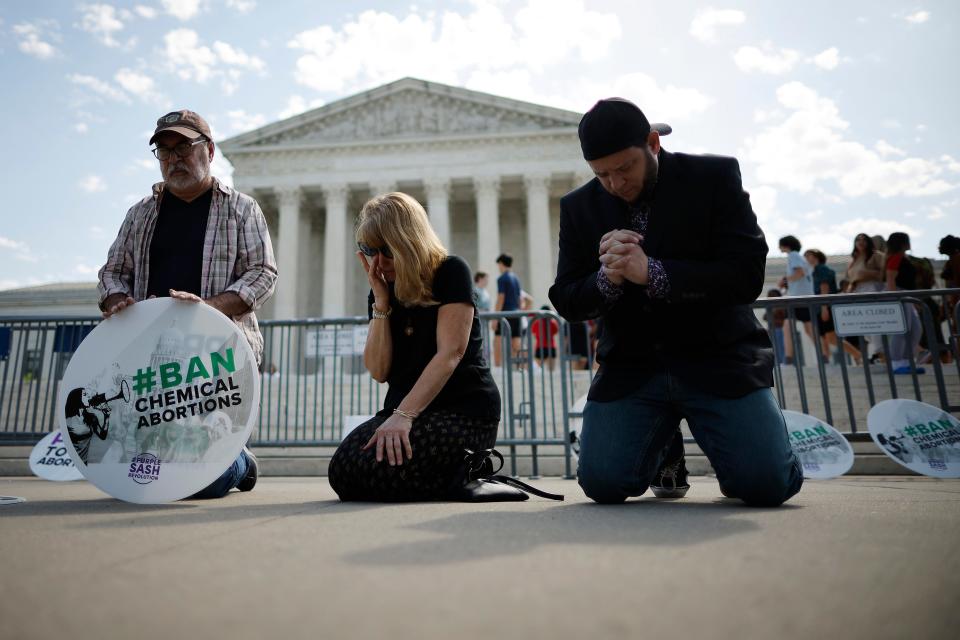In first major abortion case since Roe's demise, Supreme Court to weigh in on mifepristone restrictions
- Oops!Something went wrong.Please try again later.
WASHINGTON − Eighteen months after the Supreme Court overturned Roe v. Wade, the abortion debate has returned to the high court.
The justices agreed Wednesday to step into the monthslong legal battle over the abortion pill mifepristone and review an appeals court decision that would impose significant restrictions on access to the drug. The case comes as pregnant people, voters and courts continue to grapple with the decision to wipe out Roe, the landmark 1973 decision that made abortion legal nationwide.
A decision probably would land in June, just as the 2024 presidential race heats up.
Explainer: Mifepristone 'safer than Tylenol,' experts say amid court battle over major abortion pill
The two cases the court granted − one from the Biden administration, the other from the drug manufacturer− arrive as the fallout from last year's abortion decision continues to alter the nation's political and legal landscape. This week, several state courts are weighing high-stakes abortion restrictions.
In Texas, the state's Supreme Court ruled Monday that Kate Cox, a Dallas-area mother carrying a fetus with a fatal condition, did not qualify for an abortion because her doctor had not met a legal standard required to obtain an exception to the state law. Her lawyers said that Cox chose to have the procedure in another state.
The Cox case has refocused attention on abortion just as some Democrats are urging President Joe Biden to make it a central theme of his reelection effort. Biden's campaign manager, Julie Chavez Rodriguez, blamed the "chaos and cruelty" Cox endured on the GOP front-runner, former President Donald Trump.
"Stories like Kate Cox’s in Texas have become all too common,” she said Tuesday.
"Across the country, we’ve seen unprecedented attacks on women’s freedom to make their own health decisions," Karine Jean-Pierre, the White House press secretary, said in a statement minutes after the Supreme Court granted the mifepristone cases. "This administration will continue to stand by FDA’s independent approval and regulation of mifepristone as safe and effective."
A federal appeals court in Louisiana this summer said it intended to limit access to mifepristone, ruling that the Food and Drug Administration overstepped its authority when it made it easier for Americans to obtain the drug by allowing prescriptions to be filled by mail. That ruling from the U.S. Court of Appeals for the 5th Circuit was put on hold as both sides prepared to resolve the matter at Supreme Court.
The 5th Circuit's decision dismissed a part of the lawsuit that challenged the FDA's underlying approval of the drug at all. It also allowed the FDA's approval in 2019 of a generic version of the drug to stand.
Notably, the Supreme Court declined to take up a separate case that challenged the FDA's underlying authority to approve the drug. That is likely a signal that, whatever the top court does, it probably will focus only on restrictions to the drug − not its underlying and decadeslong approval.
The case was filed by a group called the Alliance for Hippocratic Medicine, which is being represented by the conservative legal advocacy organization Alliance Defending Freedom.
"Every court so far has agreed that the FDA acted unlawfully in removing common-sense safeguards for women and authorizing dangerous mail-order abortions," Alliance Defending Freedom senior counsel Erin Hawley said a statement. "We urge the Supreme Court to do the same."
Safer than Tylenol and Viagra, experts say
Critics noted how unusual it is for federal courts to weigh in on drug approval decisions by the FDA. A wide swath of government agencies and outside experts have said the drug is safer than common drugs such as Tylenol and Viagra. But the anti-abortion groups challenging the drug questioned those studies and argued that the FDA didn't follow its own protocols and ignored contrary data as it expedited the drug's approval.
Related: Too conservative for the Supreme Court? The nation's most right-leaning appeals court draws scrutiny
Biden's administration appealed the mifepristone decision in September. Since the Supreme Court's decision overturning Roe last year, Democrats and abortion rights advocates have scored a series of political victories on the question. Most recently, a majority of voters in Ohio enshrined access to abortion in the state's constitution.
In a separate emergency appeal pending before the Supreme Court, Idaho officials are asking the justices to allow it to enforce a law making it a crime for doctors to perform an abortion unless a physician can demonstrate that the mother's life is in danger. The Biden administration says a separate federal law requires emergency rooms to provide "stabilizing care," including abortions, for a broader range of circumstances than a mother's life.

This article originally appeared on USA TODAY: Supreme Court to weigh restrictions for abortion pill mifepristone

